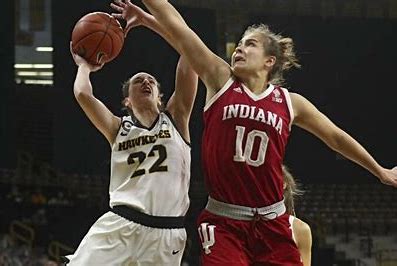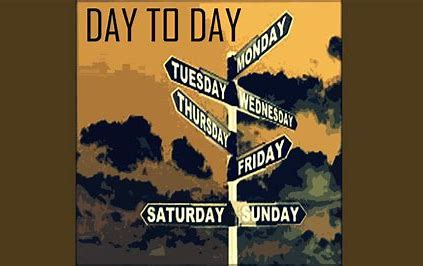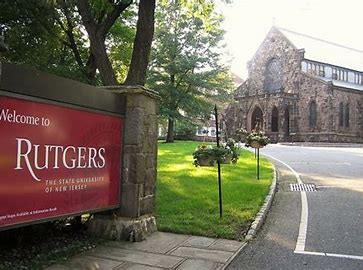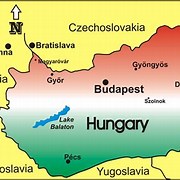Page 4 of 253
Indiana gave up 14 threes and got blown out at home by Nebraska 85-70 and was booed off their own home floor. The Hoosiers are now 14-12 on the season and have lost four of their last five games at Assembly Hall. Nebraska came to Bloomington 0-7 on the road in the Big Ten. Even more disturbing, the Hoosiers were down by 20 at half and lost by 15 despite going on a 20-3 run themselves early in the second half. They actually had a shot to tie the game — a three-point attempt from C.J. Gunn with 10:58 to go and the score at 59-56— that went wide. They were outscored 26-14 the rest of the way by the red-hot Cornhuskers, including the three at 10:40 by Jamarques Lawrence that made it 62-56 and took away all the “Magic.” As far as frees and threes, Indiana was just 4-for-21 from deep — a meager 19 percent — and missed 10 free throws. Clang, Clang, Clang went the Hoosiers. Boo, Boo, Boo went the crowd.
Freshman forward Mackenzie Mgbako led the Hoosiers with 22 points, but he was a miserable 7-of-17 from the field, coupled with 2-for-8 from deep. At least, he’s the best free throw shooter on the team. Kel’el Ware had 17 points and 12 rebounds, while foul-prone Malik Reneau had 15. Galloway had eight points, but six turnovers as the Indiana guards struggled once again. Cupps was 0-for-6 shooting and failed to score. Xavier Johnson is still not ready to play.
To make matters worse for the future, prior to this loss, Derik Queen, Montverde Academy teammate of I.U.’s only 2024-2025 commit, Liam McNeeley, decided on Maryland, obviously after seeing the horrible state of the Woodson & Company season. McNeeley may also be changing his mind, along with some of the underclassmen about next year with the program. The nightmare continues along with the boos.
It’s now been five full weeks since they glued me back together. It’s truly a one-day-at-a-time process, although I used that title in a much earlier post, but it was about running – not recovering. One step, one day, they all add up to progress, but often too slow for me. We broke up the monotony of limited activity by going to a movie yesterday, Argyll, at the Venice Spotlight Theatres Luxury Stadium 11. I was a big step up from Regal with reclining seats and food service. It cost $12.50 for the two of us Seniors with the Tuesday special, so I plan to drop the Unlimited Pass, since we don’t seem to be going as much. Plus, it saves all those drives into Port Charlotte.
As we were leaving the theater, my wife ducked out the exit door while I went to the rest room. When I went to join her, I exited through the wrong door and ended up behind the theater rather than the front parking lot as planned. The mall surrounding the theater went on and on, seemingly endlessly, so I ended up with an unexpected 15-minute walk. After another fifteen minutes searching for Grits in the grocery store, there was no need for the evening stroll. We had dinner and watched another episode of Death and Other Details followed by the start of True Detective: Night Country, the fourth season of this show on MAX.
My wife hasn’t substituted at the school this week because of the President’s Day holiday. Teachers don’t get paid for the holiday if they are absent the day before or after, so there was no need for her services – they all naturally showed up. We were supposed to have company this week, her sister, but that all changed due to the flu bug, and we had to alter our plans. We’re still looking forward to driving down to Punta Gorda on Saturday to have dinner with my friends at The Perfect Caper, my wife’s favorite restaurant. Other than that, I have grandfather duty tomorrow morning with Nora, so I’ll have to get up early and also drop my wife off at school, should they need her. For now, it’s time for my morning walk! I’m still sore, have achy shoulders, and in general still a bit uncomfortable from the surgery ordeal but life is slowly returning to normal – day by day.
Continued from Post #2480
I’ve often tried to imagine what these six close friends and refugees, including my parents, went through in preparing for this escape. Many secretive discussions were undoubtedly held regarding the plan and what to take along. It’s difficult to envision giving up everything you own and the family that you love. These were life and death decisions that very few of us ever face. I’m sure that my mother pleaded with the others to take me along, but the risks were too great. The other two couples did not have children, but they too would leave beloved family members behind. Wills and other paperwork were hastily prepared so that apartments and possessions could be passed along to those who stayed to face the consequences of Communism.
I will never know what they packed in the bed of that dump truck that fateful day, but it couldn’t have been much. We’ve all packed for vacations, weekend getaways, and camping trips where stew for weeks about what to take. They would be leaving essentially everything they had worked for behind. Maybe they packed an extra set of clothes, certainly food for a couple of days, and a few photos. It seems silly, but did they even bring along a toothbrush? Was cash and jewelry sewn into their clothing, as we often hear about with refugees? Maybe coats and blankets gathered? How can you possibly walk away from all your possessions in life, but as they say in death, “you can’t take it with you, unless you’re an Egyptian King.”
This was indeed similar to preparing for a suicide mission, departing with nothing but thoughts and prayers. I do not know how religious my parent’s companions were, but I’m certain that all of them sought guidance from above. This was certainly not an impromptu decision, so the stress and strain of preparation had to be gut-wrenching. My parents tried their best to stay strong in front of me, but even at age four I could feel their pain. My grandmother was my rock through this entire ordeal, but I’m sure she spent many dark nights in tears.
Couples go through separation in times of war. There is a constant sense of worry and fear, regarding each other’s welfare. Communication is limited to letters that take weeks to arrive. They may not have even had the money for a postage stamp. I find this all very unsettling when I think about their plight.
We would not be reunited for four years. I can’t recall if there was ever word that they were still alive, or if my grandmother and I discussed it. Once I finished that last meal with them, they disappeared into the night, and I was left with nothing but memories.
Christmas that year was just grandmother and I, wondering if mom and dad were safe or even alive. We tried to act like everything was normal, but it wasn’t. We were still Hungry in Hungary, while they were, at best, hungry somewhere else.
Now, here we were back together and living in an actual house, my first, in Moorestown, N.J., 4,423 miles away. There would be no more apartment living for our family. To get to the U.S., I had flown on my first airplane, stayed overnight by myself in a youth hostel in Amsterdam, got carsick on the ride to my new home because I’d never actually ridden in an automobile before, and now it seemed like every Friday, as a family, we would pack up our very own car, another first for me, and head to Phoenixville to see Bela and Emmi, along with my parents’ other close friends. Without all these modern conveniences, in a way it was just like being in Budapest, but I was now missing Granny.
My first Christmas in America was very special, and I was spoiled with many gifts under the tree, including a Lionel Train set that I remember most. Also, under the tree was a big toy tank that shot plastic projectiles from the rotating gun turret. Cats beware! We had missed the past three holidays together, so my parents were making up for lost time. On too many occasions in life, I would get gifts that were for both Christmas and my birthday since it was just 11-days later. However, this year, both were major family events. Bela and Emmi, of course, joined us for the two celebrations.
It was difficult to be an eight-year-old in a strange land where only a few spoke my language. While living in Phoenixville, I would often get dropped off with the DiSandri’s or Nemeth’s, so I could play with their kids while mom and dad would go partying with the Phoenixville gang. Lots of great times, food, dancing and of course drinking. Mr. Anthony DiSandri had a son named Tony that knew of all the area pick-up games of sport that we could join. Mr. Louis Nemeth’s two sons, Lou and Nick, were less athletic, so we would watch TV and play board games. Their father, Louis Sr., was a computer programmer and worked for the Water Company in Philadelphia. He brought the Basco chain of catalog showrooms business to my dad’s company, giving them their first computer system project and me an eventual job. His wife, Elizabeth was also an Engineer. All my parent’s friends were professionals, like the majority of Hungarians who immigrated to the U.S. at that time. They all contributed their great skills to the American economy.
The following year, 1962, dad was transferred for one year to Indianapolis, Indiana by RCA. Grandmother finally arrived from Hungary that year and joined us there, after two years of separation from me, and what was surely a lonely life back in Budapest. She was always a loner but took good care of me. At last, we were all back together after four long years of separation.
I particularly remember living in Indianapolis because I got to go to the 1962 Indy 500. My fascination with cars and racing began here. Parnelli Jones, breaking the 150-mph barrier, held the pole but Rodger Ward won the race. The pace car was the Studebaker Lark Daytona Convertible. My favorite, Jackie Stewart, did not race at Indy until 1966 and 1967. When I returned to the track in 1976 while serving in the Army, Polesitter Johnny Rutherford drank the milk in the Winner’s Circle. He was declared the winner when rain halted the race on lap 102. The pace car was the Buick Century.
Cars and speed were always passions of mine. My high school friend, Bob, who lived in Princeton proper, drove a used Mustang with three-on-the-floor, while his good buddy’s dad owned a modified Corvair with a mid-engine V8. My parent’s first car was a used, white, Oldsmobile convertible with a red interior from the mid-1950s. My dad’s first new car was a 1962 blue Chrysler Newport with a white top and three-on-the-floor. It was also 1962 when we moved to West Windsor, NJ. This is where I learned to drive that stick that proved handy when my dad gifted mom a shiny blue 1970 Chevy Vega, also with a manual shift. It became my job to teach her how to work the clutch. However, she would unconsciously take her eyes off the road when shifting and consequently bumped into another car in the parking lot of the grocery store. Dad then wised up and bought her an automatic 1970 Barracuda that she loved.
I had my sole auto accident in the Newport on the way to Princeton High basketball practice, but obviously learned my lesson about safe driving. My dad, of course, was very upset that I banged up his baby. Normally I would take the bus to school, but the exception came when I had after-school activities.
In 1963, my folks bought their first home (713 Devon Rd.) in Moorestown where we lived for 5 years, while I graduated from Baker Elementary’s 9th grade. The house had a creek out back that occupied my after-school time. I had a dog named Prince and a Siamese cat to replace the pet chickens of my childhood.
We came a long way to get from Budapest to the northeast United States, but other than that year in Indianapolis, we really didn’t go far once we settled in the U.S. The cities of Phoenixville, Philadelphia, Moorestown, West Windsor, Princeton, and Wayne, although they may appear as distant moves, were all in the same vicinity, despite being in two different states. The beauty of living in that area was the ease of accessibility to major cities like Philly, Washington D.C. and even NYC. Eventually, we would all move to Florida, where everything seemed so far apart.
In 1965, at 12-years old, I got my first opportunity to return to Budapest. Four years had passed since my exodus. Another of my dad’s good friends in Phoenixville, John Knezits, who also happened to be Treasurer of the Hungarian Club, bought a new VW 1600 fastback, a two-door, four-passenger model that he would pick up at the factory in Munich, Germany. He invited my dad and I to accompany him and his daughter, Sue, on this adventure. His wife, Rose, and my mother stayed home, while the four of us jumped on a plane, picked up the car, and headed for Budapest.
We visited several relatives along the way, all joyous reunions involving Hungarian food, conversation, and drink. I couldn’t get over the new car smell and was relieved that I didn’t get car sick again, as Sue shared the back seat with me. It was great to see my godfather again, as well as the cousins I had left behind. When the reacquainting was over, we drove the car to an awaiting ship and flew home. It was strange how home was now another place across the ocean.
It’s also unbelievable to think about how my parents gave up everything in Budapest and just seven years later owned a home in the United States of America. It truly is the “Land of Opportunity.” There’s also a lot more to their Hungarian fairy tale story.
To Be Continued
The Hoosiers were 20-point underdogs going into West Lafayette. Indiana had never been that big of an underdog in the three years of the Mike Woodson era, and it’s not even close. The largest line the Hoosiers have faced all year was at Illinois, where they were 14.5-point dogs. Indiana tied the Illini with 53 seconds to go and did cover despite a 72-64 loss.
The Boilermakers dominated 79-59, as they did in Bloomington the month before, 74-62. In fact, for the first time since 1933-34, Purdue ended up winning both games by a margin of 20+ points. The hapless Hoosiers didn’t even get to 60, let alone get there first! P.U. led 61-35 with 9:48 remaining. There was no magic at Mackey! Zach Edey had 29-points and rubbed it in with his first career three. Braden Smith scored 19 as the Boilers pushed the lead to 28. C.J Gunn was the leading IU scorer with 13. I.U. would need the week off to prepare for Northwestern.
I remember the decade of the 70’s when I.U. won 20-straight over the Wildcats. There was another 26-game winning streak that ended in 2003. The longest winning streak Northwestern was ever able to put together was five in a row from 1913-15. However, Northwestern has been able to recently turn the tables with an 8-6 record against the once dominant Hoosiers since 2019.
Overall, the Hoosiers are 119-57, including this disturbing 76-72 loss in Bloomington. The Wildcats led at halftime 34-26, got to 60 first on a Boo Buie three with 6:34 to go, and held on for the victory after allowing the Hoosiers to creep within 4. Kel’el Ware led I.U. scoring with 22 and Mackenzie Mgbako added a career-high 20. Northwestern got 12 more shots at the basket due to a combination of low turnovers (3) and high offensive rebounds (14). They also shot 22-28 from the free throw line. Threes and frees, again, have haunted the Hoosiers. Malik Reneau and Kel’el Ware combined for seven turnovers against Northwestern double-teams, clearly part of the scouting report. Reneau fouled out for the second straight game. Coach Woodson could soon join the ranks of Ohio State’s Chris Holtmann on the outside of the BIG looking in. Oh, and the black uniforms with red lettering were as bad looking as the I.U. players wearing them.
My wife does not like to keep things that are broken, but I always think they can be fixed. Maybe this is why I tend to be a pack rat, reluctant to throw things away? I have several tubes of Super Glue in my desk drawer, ready to repair anything. Years ago, it used to be gray tape that was the fix-it-all, but glues have now taken center stage. In fact, right now, I’m held together with glue. It was a lot better option than staples or stitches because the potential of scarring is reduced. After my recent open-heart surgery, there is a foot-long incision that runs from just below my Adam’s Apple to about 3″ above my Belly Button. It’s slowly healing but still sensitive to touch.
As time goes on this scar will become less pronounced, at least I hope so. However, there will always be the reminder of these days of recovery – sometimes painful. Today, I walked a little more than a mile, but still find it difficult to balance. I tend to weave, much like I’m on a floating dock or maybe had a few too many. It’s been over a month since I’ve had a drink – but that will change soon. I’ve also been driving again – making progress.
Yesterday, I definitely overdid it! By bedtime, I was totally out of it – quiet, despondent, and irritable. I had gotten up at 6a to escort my granddaughter to the bus stop. However, she was sick the night before, so she stayed home for school and plans to get together as a family for dinner last night also changed. Just when I thought I might have a restful day, the school called my wife in to substitute, and I drove her to work. Tally rode with us, so I stopped at the dog park on the way back home for her to see her friends. A neighbor then came over and we discussed more details about our book project, “Hungry in Hungary.” After he left, I updated the rough draft and made some phone calls.
I made myself some lunch and headed out to the rehab center to drop off some paperwork from my surgeon. After discussing options, we decided that it won’t start until after I get back from our cruise in mid-April. In the meantime, all I can do is walk. No running, lifting, or raising my arms above the top of my head. I certainly don’t need to make the long drive to the trainer for simply a supervised walk on the treadmill. I can do that on my own on the neighborhood streets. The same may be true for any weight training in the future that I can get accomplished at the nearby fitness center. Cardio rehab may very well be on my own. Next!
It was then time to pick up my grandson, Gavyn, at the bus stop and drive him home, as I once again put on my Uber cap. Once that grandfatherly duty was completed, I picked my wife up at school and we headed home for my afternoon walk and dinner. She was justifiably disappointed that I failed to get my honey-do list done. All these modifications in my schedule, book writing, and multiple errands proved to be exhausting. I was already beginning to nod-off as we watched TV, so bedtime came early. I’m definitely still tired and broken, joining the other broken stuff that we own. These include my glasses, the Valentine’s gift I bought, a sentimental Austin snow globe that mysteriously fell apart, the towel rack in our guest bedroom, the cable-TV box, and a cabinet door. I guess I’m in good company, waiting to be repaired.
Continued from Post 2477:
At no point was there likely ever a conversation between the six new refugees about going to the United States. They were convinced that they would settle somewhere near Hungary, likely Germany, and probably never return to the comforts of their homeland. Country, friends and family were reluctantly left behind by all of them, but only my parents were forced to abandon a precious child. This had to weigh heavily on my mother. Wherever they eventually landed, this tight group would always stick together, having already gone through so much trauma, already bonded for life. They were now probably “living,” if you could call it that, in a Viennese camp in the center of Traiskirchen, the former Artillery Cadet School built in 1900 and undoubtedly huddled together with other Hungarian castaways. Their names were at the very bottom of a long waiting list of those requesting to go to Germany.
Hungarians were typically loners in the European circles because they speak a tongue that is not associated with any other European nations. After all, their alphabet consisted of 44 letters. The Hungarian language belongs to the Uralic family, most notably Finnish and Estonian. Linguistically surrounded by alien nations, Hungarians always experienced a sense of isolation through much of their history, perhaps befitting their landlocked location, bordered by Slovenia, Croatia, Serbia, Romania, Austria, Ukraine, and Slovakia. Their homeland was one of nine countries behind the Iron Curtain that was built in 1949. Too often, older, more established immigrant groups treated Hungarians with disdain, ridiculing their dress and Old-World ways. It made them reluctant to speak their native tongue.
They were unique, these proud Magyars, with a history dating back to the Kingdom of Hungary, while sharing a common culture, history, ancestry, and language. They were part of a group of people who originated in the Urals and migrated westward to settle in what was now Hungary back in the 9th century. My parents were two such Magyars of the some 200,000 that relocated from Hungary to Austria in that era – nearly 2% of the population. Getting out of the country and away from Soviet control was becoming a popular activity. Where would all these Magyar refugees eventually settle?
For the stranded six, the answer soon swooped down from the sky. A large U.S. Army plane landed nearby, and the pilots asked for volunteers to fly to America. There was little time to decide, and my parent’s group was still at the bottom of the list, so they all climbed aboard. Was this the first time that living in the United States was even contemplated? Their welcome to the United States did not include the Statue of Liberty or Ellis Island, but rather at least sixteen hours in a non-pressurized, crowded cabin and a rough landing at an out of the way New Jersey military base. Immigration officials met them there. Sadly, were so far from home, with no way to communicate with those left behind but grand opportunities awaited.
For Niki, Maria, Bela, and Emmi the U.S. became a permanent home. Years later, the other couple, who remain nameless, returned to Europe. The U.S. was not for everyone. They were all then transferred by bus to Camp Kilmer Barricks, Livingston, N.J., on now what is the Rutgers University campus in Piscataway. This would become meaningful to me because it’s where I ended up going to college.
What had moved so fast during that split-second decision to fly across the Atlantic suddenly stalled. U.S. Immigration laws required everyone to have a sponsor, and none of this group knew anyone or even spoke the language. Eventually, a total stranger named Dr. Chikes, who held a doctorate in theology, came to the rescue through his church. It was just another miraculous twist in this fateful plot.
The good Doctor would assume the responsibility of trying to find jobs and housing for the three dump truck couples. It seems like the church leader always comes to the rescue in these great stories of families being uprooted. Under his direction, the next stop was Phoenixville, Pennsylvania, 28-miles northwest of Philadelphia. I’m not sure of the religious affiliation of Dr. Csikes, but my mother was raised as a Roman Catholic, as was I. Dad was brought up Lutheran, but none of us have been particularly true to our faith. We do look to the heavens for our good fortunes in life.
Bela was the first of the group to get established in Phoenixville. The rest temporarily rode on his coat tails. He had a degree in Chemistry from his studies in Hungary and quickly found a good position with a local Rubber Company. My parents lived with him and Emmi for a few years. My dad worked for a nearby steel producer but quickly learned that back-breaking work was not his forte. He then took a job as a surveyor and staked out what years later would eventually become his dream home, while taking some computer classes at Ursinus College. This led to a computer position and move with Fidelity Bank to Philadelphia in 1959 where he perfected his technical and programming skills. After those first few years in Phoenixville, the original group of six was now down to four, but their close bond kept them all in touch despite the miles apart.
For four years, they desperately tried to get me out of Hungary through the Embassies, but it wasn’t until the Iron Curtain relaxed before I was finally cleared to leave in December of 1960 at age 8. Much to the relief of my parents, I was in the newspapers as one of the first children to be released by the Russians. Maybe I wasn’t such a “bad boy” after all.
In 1961, dad got a job with RCA in Cherry Hill, N.J. as a programmer, moved to Moorestown and rented a house at 106 West Central Avenue. It was the biggest place I had yet to live. I couldn’t wait for grandmother to join me.
To Be Continued
It’s now been four full weeks after surgery, and I continue to gain strength. I drove yesterday for the first time, following the one-month guideline provided in my recovery instructions, and could feel the strain on my arms and chest. I can’t really use my arms and try to keep them tightly at my side as directed, imagining that they are enclosed in a protective tube. Even cranking the steering wheel proved to be painful.
I try to walk a little longer each day, but my thighs burn, something I rarely experienced while running. Then out of the mouth of babes, my five-year-old granddaughter suggested that my biceps were soft, poking the saggy skin hanging from my arm. She’s right – it’s remarkable how out of shape I’ve gotten. No running, no sit-ups, no push-ups for a month. “It should be expected,” they say. “You’re doing great,” they encourage. Last evening, I made it to the end of our street for the first time but was grateful that the wind was at my back on the return home.
This morning my shoulders are stiff and sore. In fact, I’m contemplating taking a muscle relaxant for the first time in a while. I am at least back to my normal sleep pattern, but this still involves a pee break every two hours or more. A night’s rest is still nothing more than a series of naps. Tally wakes me up at about 7:30a and I take my first steps of the day outside like clockwork, then gobble down a cup-full of pills. A new routine is gradually being established, as I move away from the addictive practice of running every day. Tally has her treat then begins to paw at my wife’s bedside, anxious to go to the dog park. Her substitute teaching the past two days have interfered with our dog’s favorite time of the day, when she is able to roam without a leash in the safe confines of the small dog section.
I’m supposed to start cardio-rehab this week, following my release from home care a few days ago. I also have a radiology requisition for a procedure to drain fluids from around my lungs. In both cases, I’m still finding a lack of cooperation from our regional hospital in accepting orders from my Tampa General Hospital surgeon. The excuse is that their systems apparently do not interconnect, so I have to make extra phone calls to get appointments arranged. In my mind, it’s the fact that they are uncooperative competition. It’s often become more painful than the actual surgery. I’ll be making more calls once I get back from my walk.
The walk at least took the focus off my tense shoulders and moved it to my feet and legs. For the first time, I returned to my standard running route, but only did a small section. My legs, like everything else, have weakened while my feet lack balance. At times, I feel a bit light-headed and unsteady. The beauty of walking over running is that I can actually stop and talk to people. I’m also not wearing my ear buds, so I can actually hear them. By next week, I should be able to make it a full mile, but now it’s just a matter of an extra block. There are no obligations today but a shower and shave. My wife has a tap class, haircut, and dental appointment. At some point, she and I will exchange Valentines.
Here is this year’s Valentine tribute to my wife, who has been so very supportive and loving this past month following my open-heart surgery. She stayed with me at the hospital, sleeping several nights in a chair and has been at my side throughout this ordeal. As is the tradition, I bought her a Limoges Box that unfortunately arrived broken. It’s a London Phone Booth, where we spent our last vacation. I tried to repair it but ended up just adding a Band-Aid strip. I’ll eventually buy her another one to replace it, but I think it’s fittingly appropriate with my broken self still on the mend.
Heart Felt
I’m on the mend,
The phone booth not.
My Valentine’s gift,
Is broken and shot.
It was a reminder,
Of better days.
Our London stop,
And Marriott stay.
No problems there,
Unlike your last.
As I continue,
To recover fast.
Fewer pills,
Goodbye Sky Walker.
My numerous scars,
Still quite the shocker.
I can’t drive,
Even Fifty-five.
In fact, I’m lucky,
To be alive.
The best I can do,
Is a longer walk.
Though breathing hard,
There’s time to talk.
For your loving care,
It can’t be ignored.
You should win,
A Daisy award.
Unlike Humpty Dumpty,
I’m back together.
A leaky valve,
My storm to weather.
I’ve been patched,
A brand new start.
This Valentines Day,
A stronger heart.
Thanks for being,
My special Valentine,
Lucky for me,
That you are mine.
My love for you,
Will get me through.
Heart felt gratitude,
For all you do.
Broken things,
Can be replaced.
And mars and cracks,
Can be erased.
Just add a Band-Aid,
And all is well.
What once was broken,
Can hardly tell.
Copyright 2024 johnstonwrites.com









